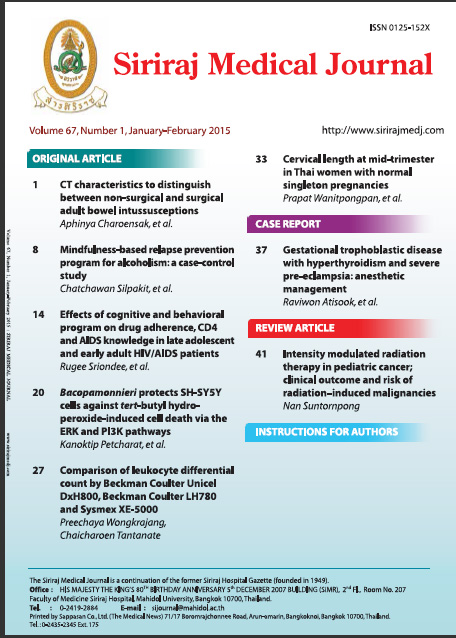Comparison of Leukocyte Differential Count by Beckman Coulter Unicel DxH800, Beckman Coulter LH780 and Sysmex XE-5000
Abstract
Objective: Leukocyte differential count (LDC), a component of complete blood count (CBC), is important in the diagnosis and follow-up of various diseases. Inter-instrument comparison of LDC is important in the laboratory using multiple analyzers to ensure the precision and reliability of test results.
Methods: One hundred and twenty EDTA blood samples were collected and analyzed using the DxH, LH, and XE. Regression and correlation analysis, intraclass correlation coefficients (ICC), and difference plots between the LDC findings from each analyzer and the means of all methods were analyzed.
Results: Neutrophil, lymphocyte, monocyte, and eosinophil counts from 3 automated hematology analyzers were strongly correlated (r2 > 0.97, p-value < 0.001, and intraclass correlation coefficient (ICC) 0.89-0.99). However, a negative bias was observed when comparing the monocyte count from the Sysmex analyzer and the mean of all 3 analyzers.
Conclusion: Leukocyte differential counts between or among different models and/or brands of hematology analyzers may be different. From this study, the correlations of leukocyte differential counts between analyzers were excellent, except for basophil count. Monocyte counts from the Sysmex analyzer showed a negative trend. Laboratories should evaluate this significance, in terms of both quality management and clinical aspects.
Keywords: Leukocyte differential count, automated hematology analyzer, Beckman Coulter DxH 800, Beckman Coulter LH 780, Sysmex XE-5000
Downloads
Published
How to Cite
Issue
Section
License
Authors who publish with this journal agree to the following conditions:
Copyright Transfer
In submitting a manuscript, the authors acknowledge that the work will become the copyrighted property of Siriraj Medical Journal upon publication.
License
Articles are licensed under a Creative Commons Attribution-NonCommercial-NoDerivatives 4.0 International License (CC BY-NC-ND 4.0). This license allows for the sharing of the work for non-commercial purposes with proper attribution to the authors and the journal. However, it does not permit modifications or the creation of derivative works.
Sharing and Access
Authors are encouraged to share their article on their personal or institutional websites and through other non-commercial platforms. Doing so can increase readership and citations.











